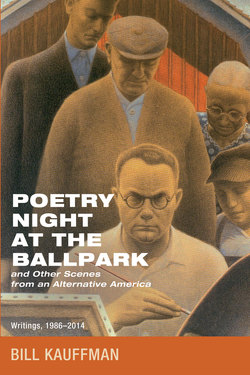Читать книгу Poetry Night at the Ballpark and Other Scenes from an Alternative America - Bill Kauffman - Страница 25
На сайте Литреса книга снята с продажи.
J. Evetts Haley: The Texan Who Saw Through Lyndon
ОглавлениеThe American Enterprise, 2000
J. Evetts Haley was raised in Midland, Texas, and worked his family’s ranch along the Pecos River, punching cows instead of a time clock. As a young man he had an epiphany: “History was right here at home”; so he would spend his lifetime recording the story of his Texas Plains. He also composed one of the best-selling—if now wholly forgotten—political biographies ever written.
After graduating from West Texas State, Haley roamed the plains, amassing a vast collection of cattle-related Texana. His Charles Goodnight: Cowman and Plainsman (1936), which has been called the finest biography of a frontiersman, tells us how to skirmish with Comanches, treat rattlesnake bites, and pull an arrow out of a man’s neck. Through a “flow of tobacco juice and profanity,” Goodnight, who was born three days after Texas declared independence, explained the code of the panhandle to his bookish young landsman, and for the rest of his life Haley would live by that code in an often uncomprehending world.
Haley was fired from the University of Texas in 1936 when he denounced President Roosevelt and assumed leadership of the “Jeffersonian Democrats of Texas.” The obstreperous Haley remarked after taking his stand, “it’s going to mean I’ll get fired, but my folks never started for San Jacinto and then turned back.” He added, “I will welcome being fired and go back to my old job of punching steers—those that escaped Henry Wallace’s cow killers.”
The poetical rancher would write the lives of cowboys and oilmen, store-keepers and outlaws, bank robbers and patrolmen, but his most notorious work (and the book for which he was virtually crucified) was an act of atonement “for the shameful part Texas has played in foisting” on Americans an “evil genius”: Lyndon Baines Johnson.
A Texan Looks at Lyndon: A Study in Illegitimate Power (1964) is one of the great stories in self-publishing. Even small houses shied from a book that followed, with Texas Ranger doggedness, the trail of theft, defalcation, and vulgarity left by the President of the United States. As Bill Modisett relates in his biography of Haley, when a publisher asked the author if his lawyer had vetted the book for libel, Haley replied, “Hell, he says there’s libel on every page, that’s what he says. But I’m a historian. . . . [M]y obligation is to tell the truth. . . . When it comes to lawyers, I’ll talk to them about a matter of policy. But when it comes to history, I don’t ask them, I tell them!”
So Haley published the book himself, with the proceeds from a cattle sale. In samizdat fashion, Americans unsatisfied with the sonorous officialisms of Walter Cronkite and Hugh Sidey bought an astonishing five and a half million paperback copies.
Reading the book today, one is struck by the eerie parallels to a later tactile southern Democratic President and maudlin cracker with the hots for every woman not his wife. The habitual lying, the craving of power for its own sake, the blistering of subordinates too cowardly to tell the Great Man to take a flying leap: LBJ comes off as a slightly less unctuous Bill Clinton.
Haley depicts Lady Bird Johnson as a “Lady Macbeth,” cold and calculating, caring “more about her husband’s career than her husband”—although Lady Bird had the grace to disappear into Texas once their time was up.
In one sense, the book has aged poorly: The reader cringes when the segregationist Haley huffs and puffs over LBJ dancing with the wives of African American congressmen. But his essential thesis—that Johnson was a power-mad liar and crook of Texas-sized proportions—has been validated by the first two volumes of Robert Caro’s definitive biography.
Haley was “fully aware of the terrible recriminations of illegitimate power that may, with certainty, be expected to follow” the book’s publication; the IRS, FBI, and even postal inspectors paid their disrespects to the Plains’ Tom Paine. The lapdog press was sicced on Haley; overnight, the distinguished historian was diagnosed as being “a case of unhospitalized paranoia.” Imagine: He claimed that Johnson had stolen the 1948 Senate election and had become a millionaire many times over by virtue of talents other than shrewd market calculations!
J. Evetts Haley lived ninety-four years, though his cow-punching days ended at age eighty-two, when he was thrown from his mount while helping during spring branding. He left us a priceless record of his Texas Plains—and an example of how anchorage in a regional culture can sustain a man who tells Truth to Power, fully aware that Power may reply with both barrels.
